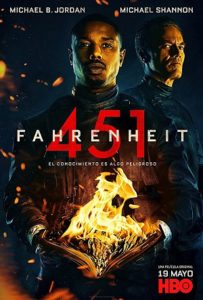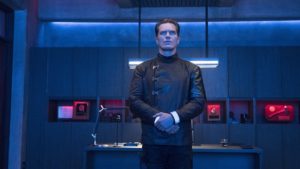 All I had to see was the poster with the two awesome Michael’s on it and I was ready to throw my money at the screen. Fahrenheit 451 proved to be worth it for me.
All I had to see was the poster with the two awesome Michael’s on it and I was ready to throw my money at the screen. Fahrenheit 451 proved to be worth it for me.
The film is getting a lot of flack for diverging from the source material, or being too tame, but I think we could use things that are a little more dialed down sometimes. You can still make powerful points without excess, and less is usually more. What I want to do here is share some of the reasons why I think this film did its job thematically, and why it’s okay in this instance to make the changes it did.
The chief reason changes were necessary is because Bradbury’s work honestly doesn’t age very well. The themes he presents are timeless, but the futures he foretold and the worlds he imagined feel dated and don’t jive with the future that has come to pass. Director Ramin Bahrani’s vision brings to life the themes and struggles of Fahrenheit 451 in a way that makes more sense to us. It’s not a future that has come to pass, but rather a future that is already here…
We already live in a world that wants to erase the bad parts of history—that wants to erase any piece of literature that is a negative reflection of the time in which it is was written. We can’t seem handle anything that contests our beliefs or offends us. We align ourselves only with people and things that support our personal narratives, instead of allowing opposition to sharpen and challenge us. This also reveals the danger we are facing with spreading counterfeit history and the inability to civilly discuss the truth. Additionally, we can’t bear to read literature or watch films that include things that go against our modern sensibilities. Yes, we come from a dark past, but if we erase it, the future will be just as dark.
We already live in a world that glorifies happiness as THE endgame and suggests that anything that doesn’t forge happiness must be eradicated. We already edit and filter out what looks or feels bad from our social media posts and can often create a falsified image of how we are truly living and feeling. The pursuit of happiness has the potential to consume us, thereby destroying lives and relationships. It can make us believe that anything negative must go, but we need that opposition in order to truly be whole and see clearly.
 We already live in a world that sensationalizes horrific events and turns them into Reality TV. In Fahrenheit 451, The firemen who burn the books actually have “fans” and their acts are glorified on building-sized screens for the world to see. I love this film’s use of emojis on the gigantic screens as humans watch events unfold, because that is basically mirroring how irreverent we can be on social media as it is right now.
We already live in a world that sensationalizes horrific events and turns them into Reality TV. In Fahrenheit 451, The firemen who burn the books actually have “fans” and their acts are glorified on building-sized screens for the world to see. I love this film’s use of emojis on the gigantic screens as humans watch events unfold, because that is basically mirroring how irreverent we can be on social media as it is right now.
We already live in a world in which we are being watched constantly. In the film, we are even shown a version of Amazon’s Alexa called Yuxie. I am personally wholeheartedly against Alexa and any other device like it, so I immediately connect with the commentary on the lack of privacy and the Big Brother that these devices truly are. Even when they tell Yuxie to “go dark,” she never really goes dark—she’s always listening. It’s already been proven than Alexa does the same thing, making this “future” alarmingly present.
So while this film changed aspects of the origin, I felt it was necessary to replicate the world that actually is, rather than the world Bradbury imagined when he published the story in 1953. The essence of the story, particularly its themes, remains intact even if the details do not.
 I watched Bahrani’s 99 Homes just a few days prior to watching this film, and I love the intensity he brings to his protagonists and antagonists. They meet in a gray area and have a sort of boxing match of wills in both films. Michael Shannon (who also starred in 99 Homes) and Michael B. Jordan are currently two of my favorite actors, so I was ecstatic to see them side-by-side in this movie. A surprising aspect of Fahrenheit 451 is that it divulges more of the internal struggle of these two men Beatty (Shannon) and Montag (Jordan), more than it does their struggle against each other.
I watched Bahrani’s 99 Homes just a few days prior to watching this film, and I love the intensity he brings to his protagonists and antagonists. They meet in a gray area and have a sort of boxing match of wills in both films. Michael Shannon (who also starred in 99 Homes) and Michael B. Jordan are currently two of my favorite actors, so I was ecstatic to see them side-by-side in this movie. A surprising aspect of Fahrenheit 451 is that it divulges more of the internal struggle of these two men Beatty (Shannon) and Montag (Jordan), more than it does their struggle against each other.
Shannon is always a powerhouse performer, and that’s no exception here, but I was amazed by what I saw in his character. Beatty is hard as nails on the outside. He has Montag burn his hand with a lighter for basically a minute without flinching and explains that his resilience comes from years of being numbed by his work as a fireman. Behind the curtain, however, Beatty wrestles with his urge to learn and express himself. He has Yuxie go dark just so he can pen pieces of poetry on cigarette wrappers. His nature hungers for expression—it’s his own fire. He claims to support the burning of materials with soldier-like resolve, yet he has memorized passages of books and can’t seem to quench his own curiosity. The struggle creates a self-loathing that ultimately, and heartbreakingly, conquers his will to be free.
I think this is something many people can relate to. The desire to imagine, create, or even just express themselves freely, but feeling that they can’t because “reality.” We’ve long been taught to believe that reality is our enemy, a master we must serve, but that’s a huge lie. When we live freely in acceptance of reality, that is when expression and creativity can truly flourish.
 This same hunger is present in Montag, who has also been trained and brainwashed to believe and act in a certain way. Perhaps it’s because of his youth, but Montag differs in one crucial way. He doesn’t allow anything to be his master, not even reality. Montag opens his eyes once he sees a woman willing to burn with her books, to die for them. The question stokes his own fire… Why? Like most stories, it’s the curiosity behind the “why” that leads protagonist on a quest for truth.
This same hunger is present in Montag, who has also been trained and brainwashed to believe and act in a certain way. Perhaps it’s because of his youth, but Montag differs in one crucial way. He doesn’t allow anything to be his master, not even reality. Montag opens his eyes once he sees a woman willing to burn with her books, to die for them. The question stokes his own fire… Why? Like most stories, it’s the curiosity behind the “why” that leads protagonist on a quest for truth.
This quest then leads to an obvious confrontation with Beatty, but what’s interesting about their opposition is not that they are different, but that they are exactly the same. The have the same fire within them, the same desire. Shannon’s shaky delivery of his line, “I too desire…” really got under my skin. So full of desperation, yet bridled by an unnecessary loyalty to a false doctrine.
Their confrontation comes to its climax in a barn where essentially the Holy Grail of books and knowledge is being kept—the OMNIS. The Omnis is every piece of literature in existence uploaded digitally and then encoded into DNA. It’s a pretty far-fetched idea scientifically, but it’s more symbolism than anything. Omnis is Latin meaning “all” or “the whole.” We hear it most commonly in the form “omniscient” or “all-knowing.” The Omnis has been placed in the DNA of a bird. Once it is retained at labs for testing, the Omnis will be then be distributed to all mankind. Montag chooses to die for this possibility, releasing the bird to the sky just as Beatty opens fire to burn him. I absolutely adored the final images of the film in which we see the bird flying on its own for a while, and then finally joining a flock. The flock grows and grows and dances in the air until fadeout.
Fahrenheit 451 flows like an extended episode of Black Mirror, especially relating to its themes on the dangers of technological takeover. Ultimately, it is a cautionary tale not about our future, but about what we need to do in the present to ensure that we have a good one.

